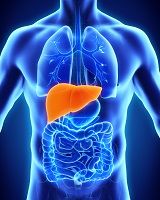Liver Disease: Double Duty for "Remo"?
An investigational diabetes drug called remogliflozin etabonate appears to also show promise for treating a common liver disease, non-alcoholic steatohepatitis (NASH) and its precursor non-alcoholic fatty liver disease (NAFLD).

An investigational diabetes drug called remogliflozin etabonate appears to also show promise for treating a common liver disease, non-alcoholic steatohepatitis (NASH) and its precursor non-alcoholic fatty liver disease (NAFLD).
According to researchers for Islet Scie and NAFLD patients as well.
“The numbers look good,” said William Wilkison, PhD, chief operating officer of Islet, in a news conference this morning at the International Liver Congress in Vienna, Austria.
Islet now plans a formal trial of Remo’s efficacy in NASH. One unanswered question is whether the drug works simply because it causes weight loss in anyone—including healthy people—who takes it or whether it directly addresses NASH.
“We still need a NASH trial,” Wilkison said, and the company expects to start one later this year.
In clinical studies, Remo showed it could significantly improve insulin sensitivity and beta cell function, as well as reduce body weight and levels of alanine aminotransferase (ALT). “The ALT findings look very promising,” Wilkison said.
In pre-clinical studies, the drug significantly reduced fat accumulation in the liver and caused a marked reduction in the levels of circulating markers of oxidative stress. Unlike other drugs of its class (SGLT2 inhibitors), Remo has intrinsic anti-oxidant activity. Wilkison said that could reverse steatohepatitis and oxidative stress, both of which get worse as NASH progresses.
The clinical study consisted of 336 treatment-naive subjects with type 2 diabetes and an HbA1c between 7.0% and 9.5%. Subjects were equally randomised to each of the remogliflozin etabonate treatments (50, 100, 250, 500 or 1000 mg twice daily), matching placebo or 30 mg pioglitazone (once daily).
By the twelfth week of the study, remogliflozin etabonate improved insulin sensitivity by 6-33% and beta cell function by 23-43%. Patients receiving remogliflozin etabonate also lost from 1.4 to 3.6 kg of fat vs. patients on a placebo.
He said it was important to note that a post-hoc analysis of changes in ALT indicated that patients who got the drug and who had elevated ALT levels showed statistically significant reductions of 32-42% at the twelfth week of treatment as compared to placebo.
Commenting on the study, Markus Peck, secretary general of the meeting’s sponsor organization, the European Association for the Study of the Liver, said the results were encouraging. But he added that he is awaiting findings of more research to clarify whether the drug works simply because of its weight-loss effects.
NAFLD and NASH are commonly, though not exclusively, seen in patients who are obese.
In an interview, Wilkison said that the drug could have potential as an obesity treatment.
"It does cause weight loss in the healthy obese -- if that's not an oxymoron term," he said, "But it is a matter of whether it would cause enough weight loss for the price."
Despite the rise tide of obesity, so far drugs have not sold well, Wilkison said.